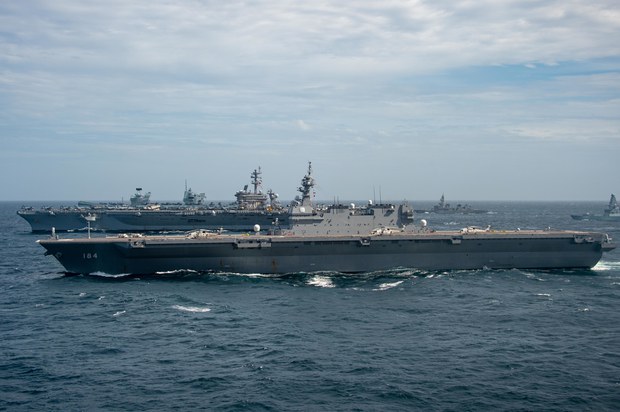US Aircraft Carrier Returns to South China Sea as ASEAN, China Meet
2021.10.27
 The aircraft carrier USS Carl Vinson and Japanese destroyer JS Kaga sail together in the Bay of Bengal, Oct. 17, 2021.
The aircraft carrier USS Carl Vinson and Japanese destroyer JS Kaga sail together in the Bay of Bengal, Oct. 17, 2021.
The aircraft carrier USS Carl Vinson and its strike group returned to the South China Sea this week for a joint exercise with a Japanese destroyer, officials said, as Southeast Asian leaders held a virtual meeting to discuss regional issues including a maritime Code of Conduct.
The strike group and the Izumo-class helicopter destroyer JS Kaga of the Japan Maritime Self-Defense Force were conducting maritime security operations including flights, coordinated tactical training between surface and air units, refueling-at-sea, and maritime strike exercises, the U.S. Navy said in a statement issued Monday.
“Cooperative maritime engagements and U.S. carrier operations in the South China Sea are part of the U.S. Navy’s routine presence in the Indo-Pacific,” the statement said.
The Carl Vinson last sailed in the disputed South China Sea in early September. The strike group is deployed to the U.S. 7th Fleet area of operations “in support of a free and open Indo-Pacific region,” the U.S. Navy said.
At the time of the first deployment, the group’s commander, Rear Adm. Dan Martin, told Radio Free Asia (RFA) – a BenarNews sister entity – that it aimed to ensure the “freedom of all nations to navigate in international waters.”
He also spoke about how that was threatened by “unlawful and sweeping maritime claims” in the South China Sea – an apparent reference to China.
The U.S. military and its allies have stepped up exercises in the South China Sea this year. It wasn’t clear whether the USS Carl Vinson’s latest deployment was at all timed for this week’s summit of the Association of Southeast Asian Nations (ASEAN) and various related meetings.
‘China does not want to be constrained’
On Tuesday, China joined member countries of ASEAN at a virtual summit to discuss, among other topics, the establishment of a Code of Conduct (COC) in the South China Sea.
Chinese Prime Minister Li Keqiang urged ASEAN countries to “expedite COC negotiations and strive for its early conclusion,” according to the transcript of his speech at the meeting. Despite the COVID-19 pandemic, there had been “positive progress” this year, he said.
Among the ASEAN members are other South China Sea claimants: Brunei, Malaysia, the Philippines and Vietnam.
Next year will mark the 20th anniversary of the signing of the Declaration on the Conduct of Parties in the South China Sea (DOC) between ASEAN and China. It was meant to pave the way for the COC, which is intended to be a binding agreement to reduce the chance of conflict breaking out over territorial and maritime disputes.
But the chances of finalizing it by then are slim, analysts say. China continues to press its sweeping claims, despite a 2016 Permanent Court of Arbitration award in a case brought by the Philippines. The ruling found that China’s claims to “historic rights” over the South China Sea had no basis under the U.N. Convention on the Law of the Sea (UNCLOS).
At the summit on Tuesday, Philippine President Rodrigo Duterte said ASEAN should pursue COC negotiations in accordance with international law, including the 2016 arbitral award.
China does not recognize the ruling, having declared it “null and void.”
“Basically, ASEAN countries want to curb China’s behavior, but China does not want to be constrained,” said Viet Hoang, a well-known Vietnamese commentator on South China Sea.
“Some ASEAN countries want to boost cooperation with external powers to counterbalance China’s increasing assertiveness and they may find China’s approach unacceptable,” the Vietnamese analyst said.
“ASEAN’s decision-making is based on the principle of consensus, so I can’t see how ASEAN countries and China can achieve any agreement on key issues, even if China’s ally Cambodia will take over the bloc’s presidency next year,” he added.







